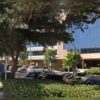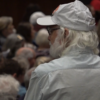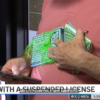March 23, 2010. The Lakeland Ledger.
LAKELAND | The PEACE advocacy group, determined to improve access to basic health care, has lost patience with the county’s Polk HealthCare Plan.
Delays in creating primary care clinics severely limit the number of uninsured people helped through the county’s half-cent indigent care sales tax, the Rev. Eileen Stone said Monday night at the group’s annual rally.
“Focusing on primary care is the best opportunity to have a healthy population,” she told more than 400 Polk Ecumenical Action Council for Empowerment members from churches countywide.
“We can do better in Polk County. We must do better.”
The tax-funded Polk HealthCare Plan went from covering 19,000 people a year to fewer than 3,000. As many as 7,000 to 10,000 could be helped in the current year, but that’s far fewer than the county’s 167,000 plus uninsured residents, said Stone, a chaplain at Lakeland Regional Medical Center.
PEACE met at First Presbyterian Church in Lakeland to finalize plans for its April 19 Nehemiah Action, when government officials are asked to commit to specific goals. That meeting will be at 6:30 p.m. at Resurrection Catholic Church in Lakeland.
More emphasis on primary care and other changes in indigent-care spending are among the group’s goals this year.
Another is continued action to create a local drug and alcohol rehabilitation facility.
A third will be continued scrutiny of efforts for more affordable rental housing.
In the substance-abuse area, a task force spearheaded by County Commission Chairman Bob English has created a business plan for opening a facility, with inpatient space for 54 men and 18 women, along with outpatient care. It would go in a building formerly used by the Polk Sheriff’s Office.
For the $2.7 million a year needed to operate the rehab program, PEACE will seek state approval for the County Commission to levy a 1 percent tax on alcohol sales. That would bring in $2.1 million. The rest would come from municipalities, grants, church and agency donations, said Harry Pettit, who chairs the PEACE drug rehab committee.
Task force members include representatives of Polk County, the Sheriff’s Office, Tri-County Human Services, Peace River Center, Lakeland Regional Medical Center, PEACE and the Drug Court.
Health care has been a long-standing concern. PEACE supported the half-cent sales tax for indigent care, passed in spring 2004, but its members said they are upset by the lack of additional primary care clinics and changes in how the only one opened so far will be funded.
It’s also concerned about the concentration of indigent-care spending on the Polk HealthCare Plan, a county-run plan in which patients are treated by private doctors and hospitals.
“The plan consumes a tremendous amount of resources,” said Stone, who heads the PEACE health care committee. “They are only going to be able to take care of a limited number of patients.”
She and others are studying an Orange County program that has grown from two primary care clinics to 10.
In Polk County, one primary care clinic – Lakeland Primary Care – opened in November 2007. Work is starting on a long-delayed Winter Haven clinic. County commissioners pledged in April 2009 to seek bids in the current budget year for creating two others. They haven’t done that yet.
And some members of the Citizens Oversight Committee, an advisory board overseeing the indigent sales tax money, have challenged arrangements with Central Florida Health Care. CFHC operates the Lakeland clinic and will run the one in Winter Haven.





